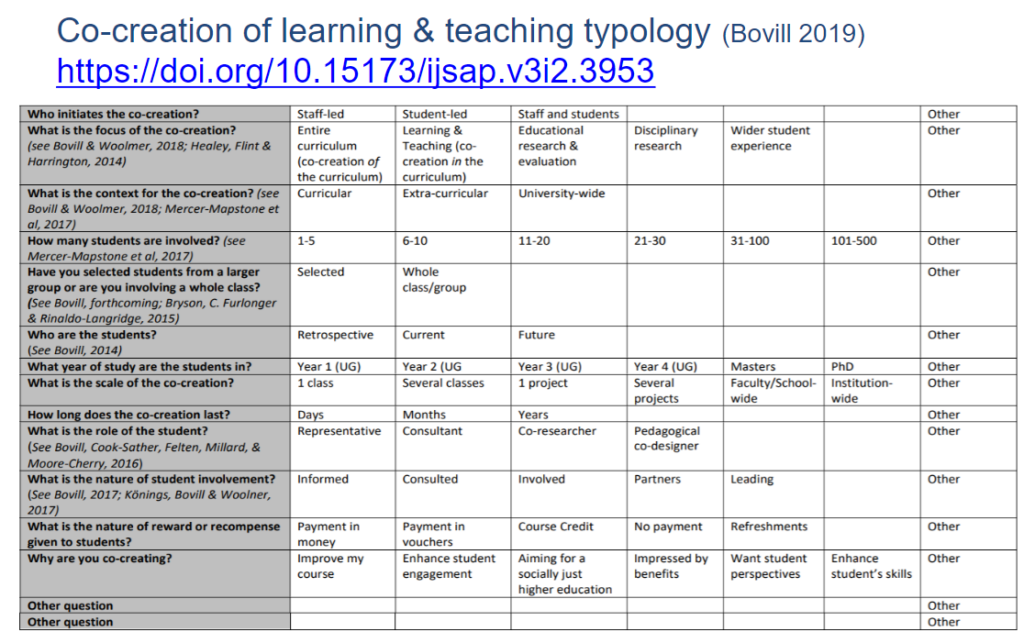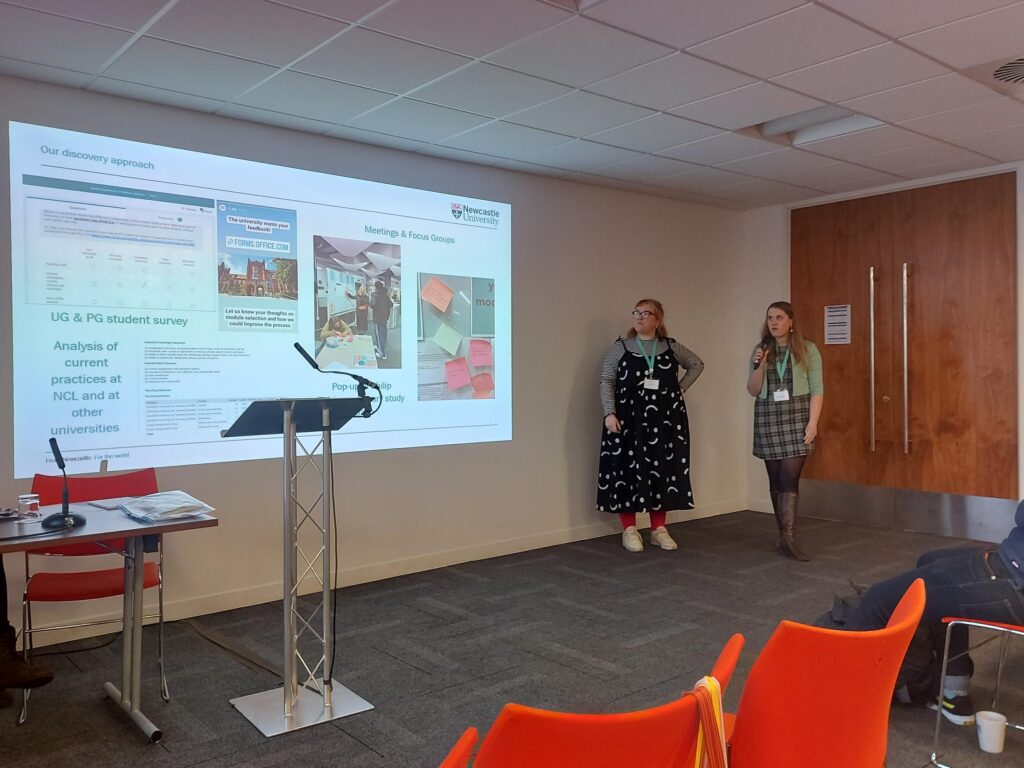Are you interested in student co-creation but unsure of the benefits, how to get involved or where to start?

If so, you might be interested in reading my review of the recent AdvanceHE symposium on Student Co-creation, which includes highlights from the event, variations and benefits of student co-creation, scholarship and the student’s voice.
The day was packed with insightful, exciting and innovative talks from international colleagues and students across the HE Sector. There was such an exciting buzz in the air all day and you couldn’t help but admire the enthusiasm from students passionate about working with educators and developing agency in their own learning experiences.
Keynote Speaker: Catherine Bovill, University of Edinburgh
The day began with Catherine talking passionately about ‘The transformational potential of co-creation from a classroom perspective both in person and online. She spoke of the many variations of student co-creation, highlighting some of her own research and scholarship along the way. Catherine shared a Co-creation of learning & teaching typology (Bovill 2019) which identifies how you might initiate co-creation, within what context and whether those sorts of activities are staff-led, student-led or both – some included in the table below:

Interestingly, this research mainly focused on students co-creating when they are already part of a programme or module – with activities such as co-creating assessments, designing essay questions or working with students to co-design what might be taught in coming weeks.
From the research undertaken by Catherine, and other scholars she mentioned, there are clearly a lot of benefits of student co-creation for students and staff, some of which I’ve noted below:
- Increased student engagement and motivation for learning
- Increased meta-cognitive awareness, sense of identity and belonging
- Enhancements in teaching and classroom experience
- Enhanced academic performance
- Transformation in assessment performance and less focus on grades and more on learning
- Enhanced feelings of belonging, feeling valued
- More culturally responsive and inclusive
- Liberating for teachers
- Increased confidence through relationship building and trust
For me that last point on relationship building and developing trust are the key ingredients to any form of curriculum co-creation, whether that’s student-staff co-creation or staff-staff co-creation, both require positive relationships but also build positive relationships – which then leads to all those other benefits above!
Bovill, C. (2020) Co-creating learning and teaching: towards relational teaching in higher education. St Albans: Critical Publishing.Bovill, C. (2019)
A co-creation of learning and teaching typology: what kind of co-creation are you planning or doing? International Journal for Students as Partners3 (2) 91-98: https://doi.org/10.15173/ijsap.v3i2.3953
Student Co-creation at Newcastle
As my role focuses on working with specific programme teams to redesign or design new curricula, I was interested in finding out how colleagues across the sector have engaged students in new programme design – a particular challenge when students aren’t already invested in the programme. I managed to catch Catherine during a coffee break to chat about this and was comforted that this isn’t just a challenge for us, it’s a sector-wide challenge. From our chat I’ve identified some approaches that we could use at Newcastle:
- Extend Staff Student Committees (SSCs) to include curriculum design conversations
- Involve your Student Union in discussions
- Organise staff, student and graduate panel discussions as part of the curriculum review process
- Provide money incentives – involve students from the outset through schemes such as Jobs on Campus
- Provide other incentives – if the budget doesn’t stretch to Jobs on Campus, would a Digital Badge incentivise students to get involved? There is robust meta-data behind these badges that employers recognise as authentic
- Gain recognition – Student co-creators often meet the criteria for Associate Fellowship of the Higher Education Academy (AFHEA)
What I realised from this symposium, and from being around all these enthusiastic students, is students are eager to get involved in shaping their own education. Student co-creation in any variation can have positive benefits not just for the students and educators but for the University as a whole.
Excitingly, we also had representation for Newcastle University at the AdvanceHE symposium. Helen Elliott, our Student Experience Manager and Meg Hardiman a second-year student in English Literature with Creative Writing, presented their work on ‘Why Can’t Module Choice be More like Netflix?’

Their work focused on finding out what information students need to make a confident choice during module selection. A student co-creation project that used Agile Methodologies.
Here at Newcastle, we have some great examples of student co-creation:
Working in partnership: tackling sustainability challenges with a student-led virtual event
Co-design Sprint: An approach to engage students in the UN Sustainable Development Goals
Students as partners in learning
In LTDS we are working on developing support and guidance on student co-creation and would love to include some of your case studies, so if you have examples do get in touch ltds@ncl.ac.uk
Parallel sessions – what stood out!
There were of course many other motivating and interesting sessions at the Student Co-creation symposium. I was particularly inspired by the student co-creation examples from The University of Manchester, and the University of Dundee.
Dr Nicholas Weise (Senior Lecturer / Teaching & Learning Enhancement Lead –Department of Chemistry) shared their approach to co-creating the curriculum with Commuter students (a student group that has lower rates of progression and success than other student groups) so that they feel less isolated, feel seen and heard and are able to engage in more social and networking opportunities. Through a flipped teaching environment students were given the opportunity to co-design active learning sessions and have a voice in designing aspects of the curriculum, such as learning outcomes, lecture content, and formative and summative assessments. What really caught my attention was how they rewarded and recognised student contributions. The University of Manchester has set up a programme, the Leadership in Education Awards Programme (LEAP) for all students (UG, PGT and PGR) and is supporting students, involved in co-designing curriculum, to gain recognition as Associate Fellowship of the Higher Education Academy (AFHEA).
Dr James Brooks (Senior Lecturer in Electrical Engineering and the Academic Lead for Pedagogy within Science and Engineering) at Manchester University talked about student involvement in co-designing a course from scratch with student partners. The extent of the involvement in the co-design had real positive impacts on the students, their experience and their grades. James’ students gave summaries of past material in the lectures, live constructive criticism of the lecture, and formal and informal peer feedback on assessments. They co-designed the marking criteria in the lectures, specified the grade descriptors in the lectures and created learning materials to evidence their learning – some really great examples of engaging students in their own learning experiences and assessments!
Dr Paul Campbell (Physics Division, University of Dundee) perhaps won the award for the most innovative and fun example of student co-creation (there wasn’t actually an award for that but he’d of won, I’m sure 😊). Inspired some time ago by The Apprentice, students on a Physic module are tasked with working in groups (typically of 5 or 6 students) to:
- Develop a 4/5 minute YouTube video that ‘informs, educates and entertains’* on one aspect of this module.
- Exercise represents 10% of the overall module score.
- Hard deadline set at the last scheduled class slot of that 11 week academic term.
- Marking scheme provided [including a peer assessment component].
- Students then take complete creative control.
Students really got creative with these videos and had lots of fun, and the benefits were clear, including:
- Improved Subject Attainment.
- Enhanced Student Experience.
- Enhanced employability (URL link to CV).
- Cultivation of true team working and identification of distinct employment roles.
There are also a lot of benefits for educators:
- Improved attainment.
- Inexpensive in terms of facilitation of kit and time investment.
- Fabulous recruitment tool.
- Facilitates true insight to both academic and character traits that serve towards generating accurate job references with demonstrable excellence.
- Also serves towards the development of rapport and enhanced confidence in the senior phase
Take look at one of the videos on Youtube and see what you think!
Thanks for taking the time and reading my blog post on student co-creation. Please get in touch if you are interested in chatting about student co-creation or in sharing your practice!
Michelle Barr, Learning Design & Curriculum Development Advisor (LTDS)
